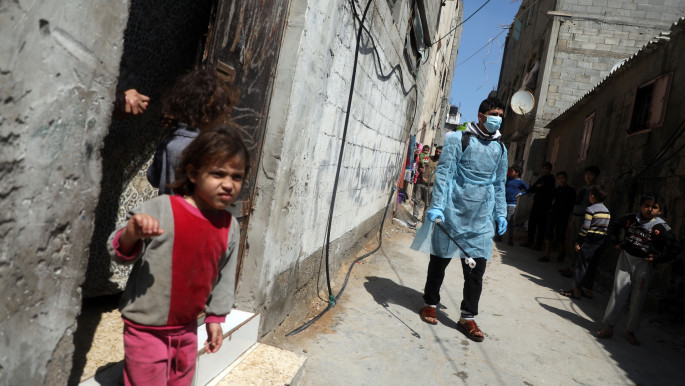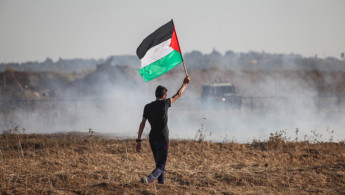Remembering Palestinian Land Day under lockdown
Despite its unassuming name, this was a clear attempt to de-Palestinianise the Galilean landscape and to confront what the government saw as 'radicalised' Arabs in the north of the country.
Much to the Israeli regime's despair, despite the ethnic cleansing nearly three decades earlier, the Galilee still had concentrated populations of Palestinians who strongly identified as such.
As a result, throughout the 1970s, the Israeli regime stepped up its confiscation of Palestinian land across the country.
Read more: Coronavirus under occupation: Why Palestine's situation is unique
In response, Palestinians began organising themselves by setting up the National Committee for the Defence of Palestinian Land, and holding meetings that were the largest gatherings of Palestinians on that side of the 'Green Line' since 1948.
It became very clear to many that Palestinian citizens could not achieve equality in the new Jewish State, which was determined to continue appropriating land for the benefit and exclusive use of the Jewish people.
Upon hearing of a massive land grab, 20,000 dunams (4,900 acres) ordered by the then-prime minister Yitzhak Rabin, the committee called for a mass strike and protests across the country on 30 March, 1976.
 |
Since 1976, 30 March has become known as Yom el Ard, Land Day, and is a significant date on the Palestinian political calendar |  |
The main demonstrations took place in the villages of Sakhnin, Arabeh and Deir Hanna and were met with brutal force.
As demonstrators blocked roads and shouted slogans such as "these villages belongs to us, not to Israel", they were met with live ammunition from the Israeli army, killing six protesters - Khayr Muhammad Yasin, Raja Hussein Abu Riya, Khader And Khalila, Khadija Juhayna, Muhammad Yusuf Taha and Rafat Zuhairi.
Protests also took place across historic Palestine, in the West Bank, Gaza and in the diaspora. This was hugely significant at the time and continues to be significant today, as it was the first major mobilisation of Palestinians since they were divided by the 'Green Line'.
 |
|
| Read more: What the coronavirus outbreak means for Palestinian refugees |
It was understood then that the Zionist project was to see as many Palestinians on as little land as possible, whether as citizens of the State of Israel or whether in the West Bank or Gaza.
Indeed, we see the continuation of this today. Just as Palestinian homes are demolished in the neighbourhoods of East Jerusalem, so too are they demolished in Lydd. Similarly, just as Bedouin villages in Area C of the West Bank are frequently destroyed, so too are Bedouin villages in the Naqab (Negev).
Since 1976, 30 March has become known as Yom el Ard, Land Day, and is a significant date on the Palestinian political calendar.
It is a day in which Palestinians in Palestine and the diaspora organise land-based activities such as demonstrations, returning to destroyed villages or confiscated land, and planting trees in places where they have been uprooted by settlers.
Yom el Ard also focuses on the concept of sumud (steadfastness) as an important part of resistance to Israeli colonisation of the land.
Despite all the efforts of the Israeli regime, Palestinians exist from the Jordan River to the Mediterranean Sea in their millions. Importantly, Yom el Ard was also the date chosen by Palestinians in Gaza to mark the beginning of their Great March of Return protests two years ago, which saw hundreds of Palestinians gunned down by the Israeli army.
 |
Israel is continuing to remove Palestinians from their land, even exploiting the pandemic to do so |  |
This year, amidst the Covid-19 lockdown, for the first time ever Land Day will be commemorated inside Palestinian homes. Instead of gatherings and protests on the land, there is a campaign encouraging Palestinians to wave flags from their rooftops. Palestinians are sadly used to lockdowns and curfews, which is perhaps why so many have taken it in their stride.
Meanwhile, the Israeli regime is continuing to remove Palestinians from their land, even exploiting the pandemic to do so. House demolitions in East Jerusalem continue, settlement building hasn't halted and there is even reported to be a spike in settler attacks on Palestinian properties in the West Bank.
Read more: Palestinian Land Day resistance comes at critical time
Earlier this month, Palestinians from Beita village near Nablus held a sit-in to try and protect land from being stolen by settlers. Israeli security forces came out in full force to give cover to the settlers and in the process shot 15-year-old Mohammed Hammayel in the head, killing him instantly.
It is hard from the present dystopic reality to look back and remember Yom al Ard and its significance, but it is perhaps more important to do so than ever. It reminds us that we the Palestinians are one, despite the borders that are imposed on us and separate us.
It reminds us that our struggle is continuous, just as the regime to displace us is. And finally, it reminds us, just as the Palestinian poet Mahmoud Darwish wrote, that, "On this land we have all that makes life worth living".
Follow her on Twitter: @yarahawari



